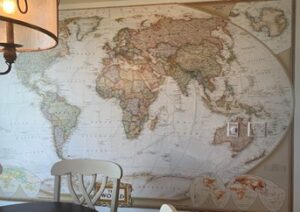
What is it about maps that draws our attention? Each of my kids has one in their bedroom, and my husband wallpapered a giant world map in the kitchen. At mealtime, we often refer to it and talk about the exotic places we’d like to visit. It seems every time we look over the peninsulas and mountain ranges, we see a new city or lake we had not yet discovered.
I recently noticed that argent, the French word for “money,” was hidden in the name of Argentina in South America. I only knew this because I took a little French in school. I wondered, is Argentina named after money? This awakened my curiosity about other names on the map.
This discovery coincided with my general alarm over the GameStop stock scandal. Money, in all its forms, was on my mind. If you don’t know the details of that event, it suffices to say that some regular people figured out a way to make the stock market system work in their favor. By using their wits, they were actually going win big and make a lot of money. When the market ringleaders realized that wealthy investors were about to lose a lot of money, they changed the rules and slammed the door on the regular folks.
These inside operators pulled back a corner of the veil that hides the world’s monetary control and showed us, perhaps for the first time, that the system is rigged. Even their media stooges couldn’t figure out how to cover it up.
With this in mind, I got online and learned that Argentina is named after currency, silver to be exact. This “trail of words” led me to a hidden system of slavery and deception and even a new meaning for the name, “Lucifer.”
I found that the meanings behind the names of some countries are disturbing. My research branched out, by necessity, to cover ancient deities, currency names, precious metals and human trafficking. Slowly, a worldwide system of monetary control began to take shape, a system that has its roots in early ancient times.



Keep in mind, money isn’t just about wealth, it’s about control of businesses, populations of people and even religion. The pictures above remind us that our culture revolves around this system that incorporates advertising, all forms of media, banks and products. We feel we need these products to be comfortable, entertained and respected. Some of these things, such as food and shelter, are necessary, and many people struggle to support their families. Whether a necessity or a luxury, products form the web of our society and our obsession over them keeps our attention focused away from our controllers.
World Empires Through Time Connected by a Mother Goddess Image
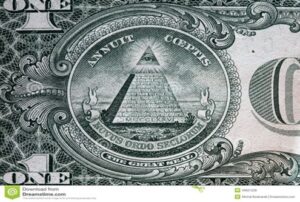
When we look at a dollar bill, we see the eye in the keystone of the pyramid that we are told is the Eye of Providence, meaning the eye of God watching all that we do. I think this actually is the Eye of Ra which supposedly originated in ancient Egypt.
The Eye of Ra is described as a feminine counterpart to the sun god, Ra, and a violent force that subdues his enemies. Often depicted as a sun disk on Ra’s head, the Eye is equated with several Egyptian goddesses including the goddess and concept called Ma’at.

Egypt Connection, an information and travel website, explains: Ma’at is personified as Ma’at, the Ancient Egyptian Goddess of Truth, Justice and Order. She is usually depicted as a winged woman. The Goddess is often shown with an ostrich feather on her head, or with a white ostrich feather. The feather of Ma’at was an important part of the weighing of the heart of the soul ceremony in the afterlife. This is where the heart of the soul of the dead person was weighed in the scales of justice against the feather.
Ma’at has 42 laws that everyone is expected to follow. If your heart is heavier than Ma’at’s feather, you get devoured by a demon instead of going to heaven. The lesson is clear: If you don’t follow the rules set by your masters, you will be destroyed. Fear is an effective way to control populations.
Today, some of our laws are unwritten, but they are still part of a pseudo-religious system that is propped up by our culture, or cult-ure. A “cult” is a system of religious beliefs and rituals. Think about how strong social pressure can be to participate in certain activities and how difficult it is to operate in opposition to society. Defying a law of culture can be as detrimental to our quality of life as breaking a judicial law.

Lady Justice who holds the “scales of justice” supposedly came from the Goddess Justitia, a goddess in Roman mythology. Historians tell us she was introduced by Emperor Augustus, but we see that Ma’at predates Justitia. The Guide to American Law, Everyone’s Legal Encyclopedia confirms: Ancient societies knew the goddess of Justice by different names. To the Egyptians, she was called Ma’at.
Western law evolved out of Ancient Roman law, so our own Scales of Justice likely originated with Ma’at.
Isis is called the “Divine Mother of the Pharaohs.” The law that’s named after her, Ma’at, is used to control us (humanity) and protect her children, the kings, queens and noble families who enforce this law and define righteousness.
Experts say Isis and Ma’at may be the same, and my research confirms that the mother goddess names (and there are many) are probably used for the same purpose. While she is Mother to the rulers, she is meant to be The Terrifying One, or the goddess of national pride, or the Goddess of Love to us. These contradictory images both intimidate and seduce the masses.
The Feather and the Eye
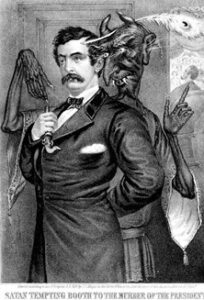
We are told today that Ma’at’s feather is a white ostrich feather, but I found an old political cartoon that shows an eye on the feather. I would expect the Eye of Ra to wear a peacock feather, and peacocks were present in ancient Mesopotamia. In the cartoon, we see Satan curiously wearing Ma’at’s feather as he urges John Wilkes Booth to murder President Lincoln who sits in the background at Ford’s Theater.
The cartoonist seems to be telling us that Ma’at and the machinations of Satan are the same, or is Satan hiding behind Ma’at’s feather? Satan is the Great Deceiver, much like the advertisements and programs we see and hear constantly. It seems likely that evil individuals would hide behind a goddess symbol.
We see the Eye of Ra in many diverse places. It’s in the NBC Peacock, the CBS eye, and in churches, temples and secret societies all over the world.
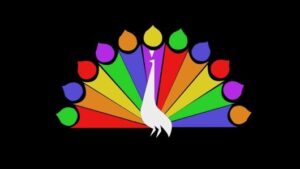

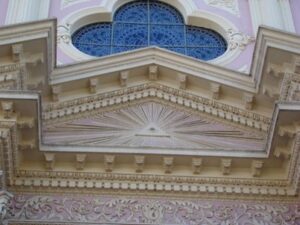
Ma’at could also mean Ma’s “limb” or Ma’s “house,” which may be a reference to the ruler’s extended family.
The “mother goddess” has been around since before the Egyptian Empire. Ma was a supreme deity and Moon goddess who was worshiped with her consort, a god named Men, in ancient Cappadocia, in modern-day Turkey. Their giant and sumptuous temple in Comana was visited by Roman Emperors and historians.
History of the Mother Goddess goes back nearly eight-thousand years, if not longer, so she could be the origin of all goddesses, if not all pagan deities.* Perhaps, she began as a benign nature-fertility goddess associated with the monthly reproductive cycle. Her role, or her image, appears to have been transformed long ago into an instrument of profit and control.
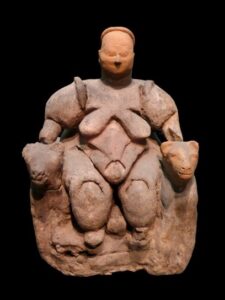
Consider our word money or mon-ey. Mon means “moon” or “man.”
Ey can mean either “eye” or “egg.”
So, we have “moon/man eye” or “moon/man egg.” Interestingly, the word egg is connected to ala, the word for “wing” (Ma’at’s law), so we can presume money, or the financial system, is man’s law. But there is another possibility that fits with everything I have found.
Eye has an ancient meaning other than simply the organ we use to see. It means physical light, as in the illumination of the sun (the Eye of Heaven), as well as “the mind’s eye” and the symbolic light of knowledge. Whoever possesses this knowledge or light controls the world. This is why the goddess is often depicted holding a torch.
As humans, we are curious and driven to learn. Secrets make us anxious and even angry. So how do you keep knowledge hidden from humanity? Give the people a false light, something meaningless to deceive and distract them. I believe the word money means man’s light, as opposed to the real light of enlightenment or knowledge.
We see the symbols of this controlled light in trademark images of the movie studios, from the search lights at 20th Century Fox, to the goddess with her torch at Columbia, to the hopping desk lamp at Pixar. Words for light are found in many places. The Egyptian city of Luxor means “gold light.” We see another connection between eyes and light in the name Augustus, which evidently means “flaming eye,” likely a reference to the sun. Aug = eyes and ustus = flaming.
Remember, it is Isis’ children who define righteousness and are born into the extended royal family of the world. It’s no coincidence that Ra means “king.” We see Ra in French “roi” and Latin “rex.”
A ruler’s “throne” or “realm” is known by the word see. Those who see have the power. That’s why the Vatican is called the Holy See instead of the Holy Sea.
Don’t get me wrong. The people who control the world may have a few tricks up their sleeves, but they are not superior or more intelligent. Light is a powerful and beautiful thing both in scientific and spiritual terms. It is perverted, however, when used to symbolize manipulation or hidden knowledge that should be used to benefit mankind.
Many years ago, singer Peter Gabriel, dressed as the goddess, gave us a good illustration of how the so-called elites love their light. I suspect that Gabriel, a member of the nobility, doesn’t actually worship the goddess, he just hides artistically under her image like they all do.

Control and Keeping it Legal
Ma is hidden in our words concerning control and contracts of society. Consider the words mayor, magistrate, marriage, manager, master, etc.
But what about Ma’at’s feather? The word feather is also known by the words pen (think of written laws) and feder. Our (feder)al government is literally government “by the feather.” Now think of the control words, penitentiary and penance. We come back to money with an English word for currency, pence.
The Hungarian word for feather is toll. Money and control go together.
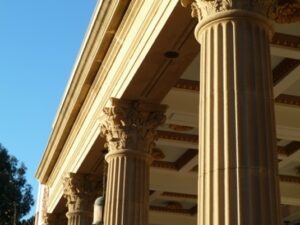
Pennsylvania can be translated into “feather column” or “feather support.” Pen also means, “top” or “supreme.” Think of the majestic columns we see in ancient empires from Babylon to Phoenicia to Rome to London and Washington, D.C. Is this a clue that our entire financial, business and government system is supported by Ma’at?
The fancy tops of those columns are called capitals. The word capital also means “money” or “of the head” in reference to livestock. Its root word kap means “head,” but it can also be translated to mean, “grab,” “take” and “hold.” Interestingly, the Latin word, captio means deception and fraud.
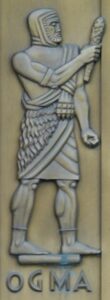
The image above represents Ogma, a god in Irish and Scottish mythology. Keep in mind, the Old Irish world for “eye” is og, so the name Ogma is formed by combining the words for eye and Ma (og + ma). This god is said to have brought speech that belonged to “learned men” apart from the local “rustics.” Is this an example of infiltration? The story goes that Ogma invented Ogham, the script in which Irish Gaelic was first written.
What’s interesting is that Ogma didn’t use a pen. According to James MacKillop’s Dictionary of Celtic Mythology, Ogma cut the words into stone, and the knife he used was his “Mother.” So, in this case, Ma’at wasn’t the pen or feather, it was the knife!
In ancient Greek, the -ma suffix means “that which is written, or “to write.” In other words, the law or truth according to those who rule.
According to the Bible, Satan is the prince of this world, and so the laws of the world are his laws. Consider the word serpent. Pent is a form of “pen” and ser means “to be,” or “I am.” Therefore, serpent evidently means, “I am the pen,” or “I am the law.”
Gold and Deception
The root word for gold, gol means “sail” or “veil.” How poetic, but what is veiled? I suspect that gold is a currency that veils the real source of wealth. Our language and world history confirm that human chattel is where the real money has always been.
The Proto-Indo-European word for womb is “gelt,” which evolved into Middle English cild or Child. Gelt (womb) also evolved into many words that mean money, payment and profit.
The Dutch and German word geld means “money,” and English “yield” means, “to pay.” Gilt is a security issued by the Bank of England. A guild (also gild) is a powerful association of merchants or a corporation.
This means that the ancient word for womb, as in Fruit of the Womb, as in Child, is apparently used internationally to mean money and profit!
An astounding number of worlds have double meanings associated with money transactions. Money and monetary control are at the heart of our language as well as our culture.
The Beginning (as written)
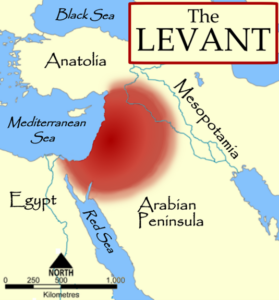
Human civilization, we are told, started in the Levant near the Mediterranean Sea, the Black Sea and the Red Sea. Note that the word Mediterranean can be translated as, “to reap the earth.” The early empires were sea-faring federations that absorbed many small kingdoms. The shipping merchants controlled the money, products and information of their day.
Think of the ancient sailors singing songs or chanting as they spun a web of influence across the seas and infiltrated many cultures. The word merchant means “sea singer.” Ships brought exotic foods and news, both real and fake, from different parts of the world. Imagine the excitement in port cities when the ships arrived. Imagine the control wielded by those who owned the ships!
We are told the Latin word portus (“port,” “harbor”) comes from pertus, which means “crossing.” It’s interesting to note, however, that the Greek word poros, means “passageway” or “opening.” That appears to to fit better since infiltration was and is the key to control.
These smaller nations prized independence and produced kings and queens who were attached to their people through blood and cultural heritage. Experts tell us they were conquered through war, but I suspect it was largely through the money system. If the Empire could make the natives crave goods from far away, and accept a debt system, they could seize control and turn a nation into a vassal state without a fighting a single battle.
If little kingdom “X” refused to pay its debts, the merchants could simply threaten to withhold food and luxury items that the people had come to depend on. If the people became angry, the Empire could replace the native king with a vassal king from the Emperor’s family, someone who could “bring the goods.”
Agents from the Empire could also tell neighboring kingdoms (Y) and (Z) lies about kingdom (X) and create fears and hostilities, even start a war.
Clues on the World Map
For the people of vassal states, there was a threat far worse than losing a shipment of sugar or wheat. They could be sold into slavery, possibly to pay off debts, and shipped to other parts of the Empire. Entire kingdoms apparently were also seized and operated as slave states.
Names for countries on the world map appear to confirm this. Their roots are words for gold, money and slaves. I realize many countries go by more than one name, but most have Proto-Indo European roots. These are very ancient words that developed into the ancient Greek and Latin languages.
The ancient Greek word for slave is “sklabos,” which evolved into the medieval Greek word slav, or “slave.” Yugo means “yoke,” a device that is put around the necks of animals so that they can pull and drag things. Yugoslavia meant the place of “yoke slaves.”
The cost of shipping expensive draft animals and feed to a far-away region of the empire would far exceed the cost of using native laborers who will eat whatever is available.
Paraguay evidently means “Teriffic Money,” or “Good Baby Producers.” Pâra is an ancient word for “money” and guay means “teriffic” in Spanish. Para is also Latin for a woman who has given birth. Since para means “money,” then baby evidently also means “money.” When slaves have children, their owner’s wealth increases.
Sources say the name Uruguay is based on a native-language word for a river in the region, but I suspect it is derived from ürü, the Turkish word for sheep or a castrated ram.
Ürü + guay = good sheep.
These country names sound like advertising slogans. Perhaps they were advertisements back in 1800 at the money houses of London where South American lands and their inhabitants were sold or leased to the highest bidder.
Uruguayan history gives us a bit of insight into what happened to natives who refused to be yoked. The Charrúa resisted giving up their land to development. Uruguay’s first President, Fructuoso Rivera, organized a successful extermination campaign in 1831 that wiped out this distinct race of humans. I suspect they weren’t killed, but were rounded up and sold.
Follow the Money
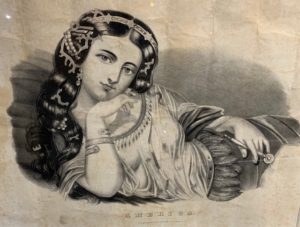
We are told that America is named after the explorer Amerigo Vespucci, but this makes no sense. I knew it didn’t make sense back in elementary school, but I believed the “learned” men and women who told me so.
When I take a closer look at the name Ame-rigo, I find that rigo (to rule or bind) is very different from rica. Rica means “rich” or “tasty” in Spanish. Ame means “soul” in Latin, but that word descended into the Ottoman Turkish alma, which means “apple.”
So, America means either “Rich Soul” or “Tasty Apple.” Both names would appeal to investors.
A quick note on Amerigo Vespucci. He was a merchant whose grandfather was a long-time chancellor of the Florentine government. It’s interesting that rigo means “to rule” since that is what his family did. His father was a notary for the Money-Changers Gild. Amerigo Vespucci was himself in charge of the central trading house for Spain’s overseas posessions.
A god’s Tears.
Remember how gol meant sail or veil? Well, it also means “flowers” or “tears.” Isn’t that an interesting group of words when we’re talking about seafaring slave traders? Sail, veil, tears…flowers.
This plays into the name, Angola, in Africa. The word could have several meanings, but they all point to slavery.
An means “womb” or “vessel” and gol means flower, so we have “womb flower,” or “vessel of flowers.” Does flower mean child? I think so, especially if you look at another possible translation.
Angola could refer to An, as in the Ancient Sumerian god, An. Gol is “weaping,” so Angola means “An’s tears.” This makes sense when you know that the ancient Egyptian god, Atum, was said to create humans by crying. Children are his tears.
An, the supreme god of ancient Sumer, and Atum, the top god of ancient Egypt could be the same god. Same gods, different names through the centuries. Same shipping merchant (slave-trading) families (nobility) continuing on through different empire names.
Experts say the name, Angola, is derived from the title of pre-colonial kings called Ngola a Kolanje, but Kolanje is a word with European roots. Many native words I came across have, upon closer inspection, European roots. I take that to mean the cultures were infiltrated earlier than we are told or the people were identified by European rather than tribal names.
We Are in This Together

Australia is said to be named after the Latin word australis which means, “southern.” It is impossible to ignore that the root word of Australia is träl, which means “slave.” It’s a significant coincidence, considering Australia’s history of using “convict” labor.
Träl comes from treg and dreg, ancient words that mean, “to pull” or “to drag.” (This explains the term, Dregs of Society.) Australia means, “country of slaves.”
Au is also the elemental symbol for gold. The word strale, according to Websters’ 1913 dictionary (via the online Free Dictionary), means the “pupil of the eye.” Golden light and the Eye are woven, once again, into property names.
I came across a website that documents the hundreds of ships that transported human chattel to Australia. Many of the vessels had names that harken back to ancient deities and their stories. I was sickened by the sheer numbers. How many deliveries did these and other ships make? How many people? How many were not recorded?
These people, this cargo, were supposedly criminals, like many Europeans transported to the New World. What peasant, forced into the city (and they were, by the tens of thousands**) and not provided with a job to feed their child, would not steal a potato and become a “criminal?”
I question whether all these ships actually went to the forced-labor mines and farms in Australia. Many likely ended up at the infamous slave markets in the Middle East.
Think of the shipping companies that lured poor immigrants onboard with promises of a better life in the New World. Once onboard, these powerless people had no control over their final destination and no way to communicate their fate to relatives back home. Ship captains were not convicted for brutality and murder, so it’s likely their family and business connections would enable them to commit other lucrative crimes. ***
World-wide System
Experts say human trafficking is worse now than ever before in history. If that is true, it’s not the activity of a few renegade criminals. It would have to be sanctioned and controlled by those who control international shipping, including ports all over the world. Keep in mind that merchant vessels are privately owned, but regulated by governments. Ships are actually paid for by tax payers so that they can be used in times of war.
Modern investigators say human and drug trafficking are coordinated and share the same system, but it’s not clear exactly how. The opium trade with China provides what I suspect is a good illustration.
We are led to believe that China was historically isolated and cut off from the rest of the world, and yet it’s documented that trade relations were established between ancient Mesopotamia and China thousands of years ago. Regardless, in the late 18th century, merchants had a problem with the people of China. Customers in the West craved China’s porcelain, silk and tea, but the Chinese weren’t interested in the factory products these merchants peddled. This gave the Chinese people power in the money system, but not for long.
Tobacco was popular in China and opium could also be smoked. Agents from the East India Trading Company, a giant shipping company, got many Chinese people addicted to their cheap opium from India so that Chinese consumers would be dependent on their product.
We are told that so many Chinese people became addicted that their emperor banned the sale of opium. Of course, moving trade from open markets into illegal and hidden realms is necessary in human trafficking. The drugs weakened local communities and created a desperate, addicted population that could be exploited.
This excerpt from Britanica is illuminating. As you read it, simply replace the words gold and silver with women and children:
The East India Company did not carry the opium itself but, because of the Chinese ban, farmed it out to “country traders”—i.e., private traders who were licensed by the company to take goods from India to China. The country traders sold the opium to smugglers along the Chinese coast. The gold [women] and silver [children] the traders received from those sales were then turned over to the East India Company.
The article goes on to say The East India Company used that gold and silver to buy luxury goods from the Chinese, but remember, the EIC had its own gold and silver. In fact, it minted its own coins independent of the British Crown. It wanted human chattel and operated many slave ships to transport these people around the world. The Chinese population was growing rapidly at that time. I suspect the opium trade and associated wars were cover for a huge increase in slave trade at Chinese ports. Britannica says, “Meanwhile, a network of opium distribution had formed throughout China, often with the connivance of corrupt officials.”
So Chinese officials, likely with close ties to the East India Company, oversaw the creation of a smuggling network that could move humans as well as drugs.
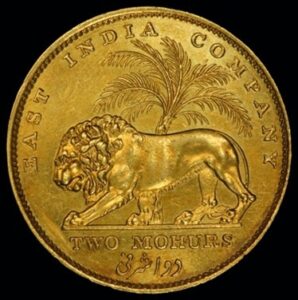
The East India Company is a historic example of global corporate power, or “corporatism,” that still exists but is hidden. There was clearly a system of cooperation and shared benefit between the King of England, Parliament and the EIC.
England’s King Charles I was deposed after the English Civil War and had his head chopped off in 1649, but curiously, his son was restored to the throne. Charles II, whose maternal grandmother was a de’ Medici, went on to grant the EIC the right to mint coins, acquire and govern over lands, and exercise civil and criminal jurisdiction over those acquired territories.
The EIC had its own navy and army and could instigate battles against native peoples wherever it liked. These battles created helpless refugees that were easy pickings for the slave smugglers who could deliver them to the nearest port.
Proof of early merchant infiltration into China is found in the names of China’s prominent cities.
Take Beijing, for instance. Beij has roots in the “Dutch” family name De Beije. The family name is also known as De Bei. I wonder if the country, Dubai, is named after the same family. Forms of the name have Latin roots meaning “to strike,” and “to germinate and grow.”
China’s shipping city of Wenzhou got its name in 760 AD. Wenz is a European name that supposedly originated in Prussia. If you follow the roots of the name back in time toward the Latin, you come to the name of the goddess Venus (Light Bearer), which is another name for Isis.

This image shows how the system, disguised as the mother goddess, spread to Southeastern China. The “Heavenly Mother,” called Ma-Tsu is seen in the back holding a torch (light bearer) and a tablet and standing on the world. She was worshipped along the coastal areas and thought to be a special protector goddess of seafarers, just like Isis. Chinese sailors and merchants helped to spread her cult into new Asian lands.
Dharma, or dhar-ma, is the divine law of Buddhism and Hinduism, just as Ma’at was the divine law in ancient Egypt. According to the Merriam-Webster website, Dharma is “an individual’s duty fulfilled by observance of custom or law.”
Orange Isn’t Just a Color
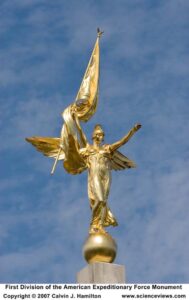
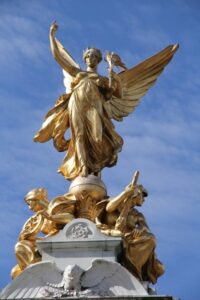
The winged goddess of victory, Nike/Athena, has a statue right outside the White House (left) and we see her statues in the powerful cities of the world. She is presented as the “Gold Angel,” often holds a torch (right) and is associated with mother goddess Isis.
Our word orange means “gold angel,” or “golden angle.” Or is “gold,” and ange, means “angle” or “angel.”
Orange is an ancient region in France that goes back to Roman times. Orange is also a powerful European dynasty, the House of Orange-Nassau. Notice the sheep hanging helplessly in a sling at the bottom of the coat of arms.
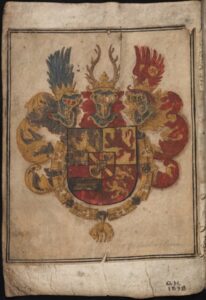
The word angel is associated with the wing and the feather, the gold and the system of money, writing and control.
Since the word or name, “orange,” can be translated as Golden Angle, it can also be associated with the Golden Ratio and the Golden Spiral.
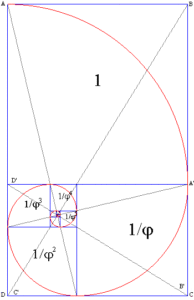
Another word for angel is engel, which could be translated as “meadow god,” or “meadow eye.” This brings to mind England, which means “meadow land.” What do we find in meadows? Flowers, or young slaves.
England used to be known as Roman Britannia. Britannia is portrayed as a beautiful war goddess wearing a Greek helmet.
Written in 1740, the popular song, Rule Brittania! illustrates the transfer of Empire power to England. Here is one verse:
To thee belongs the rural reign;
Thy cities shall with commerce shine:
All thine shall be the subject main,
And every shore it circles thine.
“Rule, Britannia! rule the waves:
“Britons never will be slaves.”
Before Roman times, the lovely English island was known as Albion or Albu. To support my point about empires changing names but continuing to be ruled by the same lines of nobles, consider this excerpt from the The History of the Kings of Britain, by Geoffrey Monmouth, written in the 12th century. The exiled Brutus of Troy was told by the mother-goddess Diana:
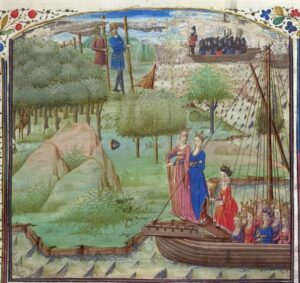
Brutus! there lies beyond the Gallic bounds
An island which the western sea surrounds,
By giants once possessed, now few remain
To bar thy entrance, or obstruct thy reign.
To reach that happy shore thy sails employ
There fate decrees to raise a second Troy
And found an empire in thy royal line,
Which time shall ne’er destroy, nor bounds confine.
“Capitalism,” vs “Free Market?”

Most of us want a system that rewards people on the basis of merit, for their hard work and good results. My own family is a perfect example of hard work paying off. We have gone from poor farmers and brick layers to non-manual labor, and we are very comfortable. I was under the impression that our monetary system is a logical and organic thing that grew according to the laws of nature and free enterprise. I thought it operated in a way that benefited most people. Now I’m skeptical that that is the case. It turns out I was never a fan of Capitalism, but rather Free Enterprise in a merit-based system.
Some would argue these slave terms are simply proof that our financial system is evolving into something better. I suspect they are clues that a deceptive system is still in use today, ensuring very few winners and many victims of slavery and usury.
If only we could demand an honest form of free-market trade based on the quality of goods and services. I think we could if we could clearly see what is truth and what is propaganda designed to support the Serpent System.
Gods Among Us (or so they think)
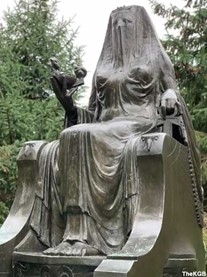
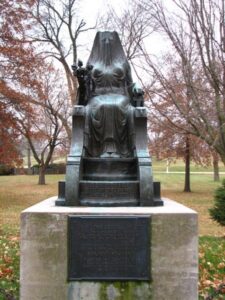
Back to Eye-sis…I mean, Isis…
A creepy statue of the mother goddess sits at President Herbert Hoover’s grave in Iowa. Just what you wouldn’t expect to find at a U.S. President’s grave! It bears an inscription that was discovered in the ancient city of Sais in Egypt at the old Temple of the goddess Neith (Isis).
For some reason, the name, Neith, is usually hidden be(neith) the other mother deity names. I can’t find a translation for Neith, but it could mean, “I Devour” since ne is a pronoun and ith means “to eat or devour.” Neith was called, “The Terrifying One.” Looking at that statue, I’d say the name fits. It’s supposed to scare us.
Taking a closer look at the name, Isis, I discovered that the ancient Greek suffix, “-sis” forms a noun of action. This suggests that I-sis could translate into, “Eye that Sees.” Sis comes from the Latin sedeō, which means “I sit,” or, “I am established,” or, “I am.” Even today, top world leaders show their power in group photos by sitting while lesser governors are made to stand.
There is an inscription on the Isis statue in Iowa. It is the same as the inscription in Egypt described by ancient historians. As you read it, you can almost hear her creepy voice speaking.
“I am that which was and is and ever will be, and no mortal has yet lifted the veil which covers me. The fruit which I brought forth was the sun.”
Again, I don’t believe the noble families worship Isis. The names of several deities, male and female, are associated with covers and veils and cloaks. I suspect the Isis statue is a private joke shared by the elites, and behind the veil we find the Serpent System of control used by people who consider themselves to be gods. (These people probably worship whatever they consider to be the ultimate source of their power, and it may not be a spiritual entity.)
Below we see Cyrus the Great, Emperor of the Persian Empire, depicted as a winged god.
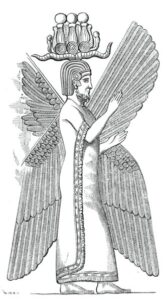
Remember that King Louis of France was the Sun King and king means Ra, so he was actually the Sun God. Pharaoh Ay, of ancient Egypt’s 18th dynasty (below right), was the son of Louiya, a foreigner who was head of the Temple system in Egypt. The temple system was synonymous with the money system.
The Proto-Italic word, louks means “light.” Could these historical figures, both named after light, be related? The God Jupiter means Day Father or Light Father.
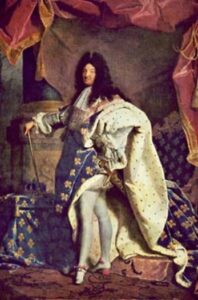
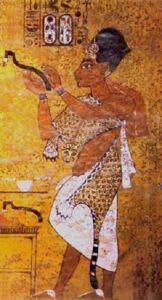
In Old French, lou also means “wolf” (think about the movie, The Wolf of Wallstreet). Wolves are animals of prey that operate in a pack or family.
Interestingly, the word lou evolved into loup in Middle French and came to mean “mask.” Masks and veils. But the elites don’t wear masks over their mouths like we do. They wear them alluringly over their eyes to hide their identities.
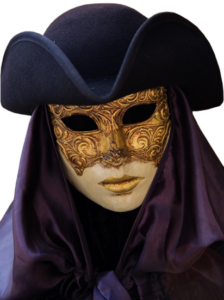
These masks are also called domino masks, after the Latin dominus, or “lord.” I can only wonder what sorts of masks they wear today.
Speaking of dominating lords, Pharaoh Ay was an advisor for several pharaohs before him, including the famous Kings Tut and Akhenaten. People don’t talk much about Pharaoh Ay, but Tut and Akhenaten’s stories have cemented public perceptions about ancient Egyptian religion and the pharaohs. Historically speaking, Ay’s family operated from behind a curtain. Ay’s royal name meant, “Everlasting are the manifestations of Ra.”
To manifest something is to make it evident or certain by showing or displaying. Where do we see manifestations of Ra, the sun god? This could be any reference to the sun, or to the beacon or light or torch that represents the hidden rulers and the hidden knowledge.
The root word of pharaoh is phare from the Latin pharos, which means “beacon” or “lighthouse.” We see the same root in pharisees, the temple controllers in ancient Jerusalem.
Recall that Augustus means burning eye. This is likely a reference to the sun. It’s no coincident the Roman rulers were called Augustus since they, too, are manifestations of the Sun God Ra, the royal line.
The bottom left is King Louis’ symbol and in the middle is the ancient Akkadian sun god, Shamash. You probably remember Barack Obama’s “Hope” symbol on the right.
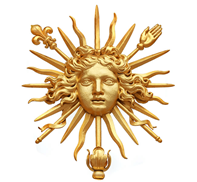
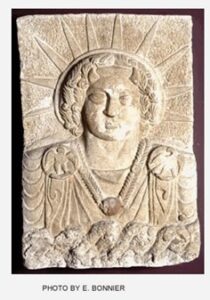

Manifestations of the sun god Ra… While I ponder these, I think I’ll relax and listen to the radio.
You know, the Ra-dio (divine Ra). Most media outlets are the voice of our controllers.
Lucifer
Lou or loo or lu, however you want to spell it, connects the mask, the light, the imperial families… and Lucifer. Lucifer, like Isis, is the Light Bearer. Lu = light or knowledge. Cifer = A method of transforming a text or numbers in order to conceal their meaning.
The very definition of Lucifer is “hidden words and knowledge!”
We were directed away from the word cipher. How many documents out there contain ciphers waiting to be translated? Perhaps hidden codes and meanings can be found in many places.
Consider that Siri, the AI assistant on our phones who knows where we are and when we breathe, is Iris spelled backward. The iris is the part of the eye that controls the amount of light that reaches the retina.
I found a word that may sum up the Serpent System or Law. It is the Latin word, finio. Fin means “staff,” but it also means “wing” or “feather.” That means that Moses’ staff may also be a symbol of control.
This staff is also called the Sapphire Staff, and believed by some to hold the light and mystical knowledge of the Tree of Life. The story goes that an angel gave the staff to Adam and Eve when they left the Garden of Eden. This “staff of knowledge” passed through the generations and came to belong to Moses and his descendants.
My translation of the Latin word finio, is “Law of the King,” or “Law of the Prince of The World.”
According to online sources, finio means “to limit,” “to set,” “to appoint,” “to enclose within boundaries,” “to restrain,” “to check,” and “to finish or terminate.” In other words, it describes the binding of our God-given abilities to achieve and grow, even to the point of death!
Through my research, I found words for “common people,” with double meanings that label us as babbling, hairless, and even as dead bodies. Are our governors laughing at us? I’m sure they have for many centuries and felt confident in the money and information system that controls us.
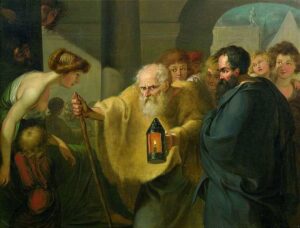
I am reminded of the story of Diogenes, a philosopher who lived in ancient Greece. He and his father were powerful bankers and his name indicates he came from a “divine” line. After being involved in a financial scandal, he supposedly gave up his possessions and slept in an old clay wine jar that came from the temple of Sybele. I question whether he actually lived or was simply “written” into existence. The symbolism, however, is intriguing when we imagine this banker sleeping curled up and cloaked inside the womb of the mother goddess. Everything is a joke.
Diogenes is famous for carrying a lantern around in broad daylight purportedly “looking for a man.” Some stories have changed this to an “honest man,” but I’m with the scholars who say it was just a man. If Diogenes couldn’t find a man, we must surmise that he saw something less than men.
I do, however, appreciate the idea that the lantern really wasn’t necessary in broad daylight. The light is all around us and we can see if we choose to open our eyes.
So let them laugh. The good news is that we, as consumers, have the power to turn their money system against them. We can choose which companies we want to buy from. We can build up ethical companies and destroy horrible ones. This means that, if we stick together, we can sway public policy any way we like, and do it without destroying workers’ and companies’ potential for merit-based growth and achievement. Imagine us, the peasants, taking control of the wheel of this merchant ship! We can refuse to be cogs that turn on a king’s whim and become enlightened hands that drive our own destinies.
Please register on this website to receive my latest essays and share on social media!
*In Hinduism, “Mahot” is the Creative God and the Universal Cosmic Mind, while Kali Ma (below, notice the eye which is combined with moon and sun symbols) is the “Dark Mother” of birth and destruction.
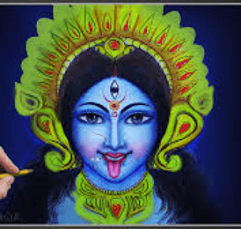
** Investopedia website on the city of London: “Between 1650 and 1750, it saw the arrival of 8,000 immigrants a year, according to historical demographer Tony Wrigley.” https://www.investopedia.com/how-london-became-the-world-s-financial-hub-4589324
*** Death ship Neptune, chartered to Australia by merchants and slave traders Camden, Calvert and King. Click here.
